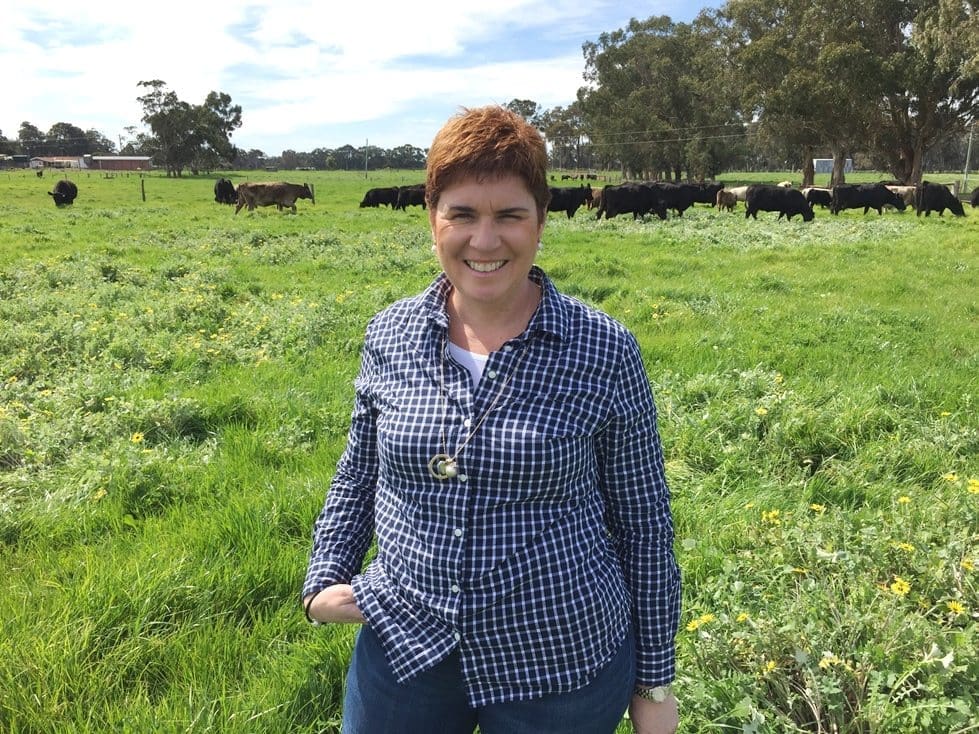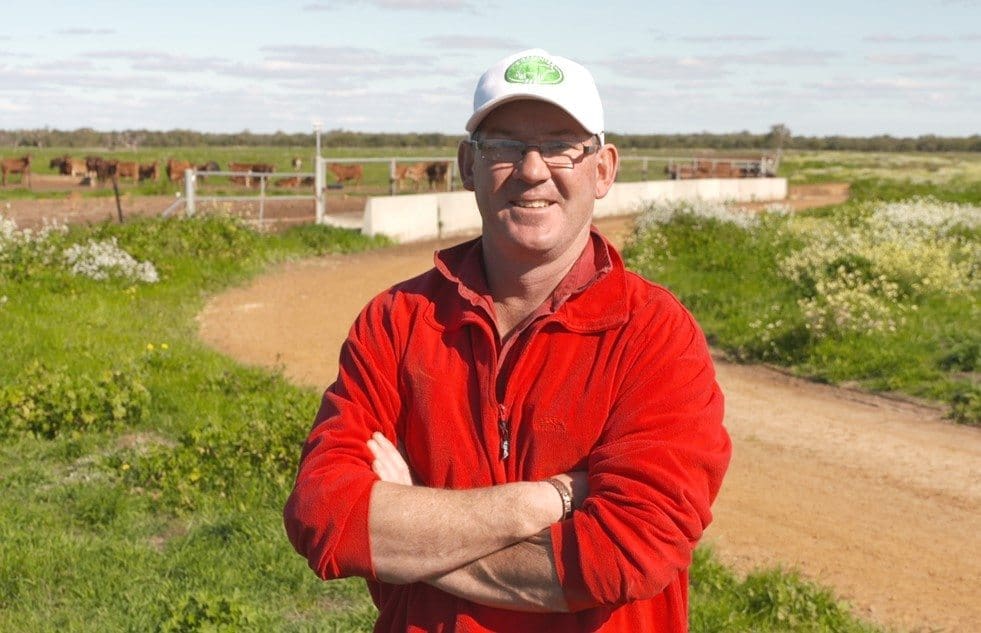
WA winner Leanne Ablett, with some of the family’s Murray Grey and Angus cattle.
BEEF producers from Western Australia’s southwest region and central grain-belt have taken out the top awards at the 2017 Meat Standards Australia Excellence in Eating Quality Awards for the state, presented at Dunsborough last night.
The awards recognise producers who have achieved outstanding compliance rates to MSA specifications, as well as high eating quality, as represented by MSA Index results for beef carcases graded during the 2015-16 and 2016-17 financial years.
Southwest region beef producers Shane and Leanne Ablett, Cowaramup earned the Most Outstanding Beef Producer award (more details below).
Carpenter Beef, Dandaragan, owned by Rami Koyu’s Central Agri Group, received the Most Outstanding grainfed beef producer award.
Russell and Sonya Mead, Mills Farm Grazing, Coolup, won the inaugural MSA Excellence in Eating Quality Progress Award for WA, for showing the greatest improvement in their MSA results since the 2014-15 financial year.
MSA program manager Sarah Strachan said the producers were to be congratulated for their commitment to produce beef that consistently achieves exceptional compliance rates to MSA’s strict specifications.
“These producers are showing they are taking notice of their feedback information to achieve results,” she said.
Shane and Leanne Ablett won their award from a field comprising of 1679 registered MSA producers in WA who consigned cattle during 2015-17.
More than 14,000 producers throughout Australia consigned almost 5.9 million cattle to the MSA program throughout 2015-17.
To be eligible for the awards, a producer’s annual MSA-graded volume had to be equal to or above the average volume consigned for the state in which they were produced.
Each producer that met the eligibility criteria received a score out of 100 weighted on two factors – compliance to MSA minimum requirements, and eating quality performance as determined by the MSA Index for cattle consigned to MSA in 2015-16 and 2016-17 financial years.
The Awards aim to raise awareness of best management practice from producers who consistently deliver superior eating quality beef in their state ultimately for the benefit of consumers and for the profitability of the industry.
Low-stress handling drives WA winners’ MSA success
Securing a premium market for high quality milk-fed beef is the focus of Cowaramup beef producers Leanne and Shane Ablett.
Their Murray Grey and Angus breeding herd, run with sons Jack, 20, and Max, 16, produces 65-70 head of progeny each year that are supplied direct to Woolworths supermarkets.
Consistently high MSA Index results – in the top 5pc of MSA-graded cattle in Western Australia in 2015-16 and 2016-17 – has seen the family take out this year’s Excellence in Eating Quality award for WA.
The award reflects the family’s long-standing efforts to improve breeding selection, apply strict culling of non-performing stock and quality feeding.
Mrs Ablett said being able to produce milk-fed beef with high eating quality boiled down to a philosophy of “weed, feed and breed.”
“We target our genetic selection at high growth rates, good eye muscle and low birthweight; get rid of any poor performers in the herd; and ensure the cattle have good feed,” she said.
Animals are managed quietly to reduce stress and the calves are kept with their mums until the last minute.
The Abletts are well under-stocked compared to the district average, running their 70 breeding cows on 125 hectares of pasture in WA’s high rainfall South West region that has been in the family for 78 years.
The property receives about 950mm of annual rainfall, mostly in winter, and has improved pastures on predominantly loam and gravel soil types.
Calving is in February and progeny are turned off into the Woolworths supply chain for processing from November to January at a target liveweight ranging from 380-420kg and averaging 400kg.
“Our stock agent has been integral in setting up and managing our relationship with the buyer since 2009,” Mrs Ablett said.
“We needed to become MSA accredited to supply Woolworths and we have now been part of this eating quality system for more than a decade.
“It has been central to us being able to access premium prices for our milk-fed beef and vital in providing feedback on processing results that go on to drive improvements we make on-farm.”
Mrs Ablett said monitoring trends in MSA Index results across multiple years was giving them great insights into the overall eating quality of their beef.
She said the business also focused on tracking and improving meat pH as a measure of animal stress and the success of low-stress handling techniques used on-farm and through the supply chain. Other key attributes of the MSA system considered important to the business included carcase weight and fat coverage.
Calf weighing starts in late September-early October and allocate paddocks and feed accordingly.
“Because we have low stock numbers and an abundance of pasture feed in most seasons, we can split and run the cattle in mobs of 20-30 head. In the final eight weeks before transport, we further fine-tune our feed management – based on regular weighing – and aim for growth rates of at least 1kg and up to 3-4kg/head/day.”
Mrs Ablett said the target for MSA rib fat measurements was 10-12mm and the family was consistently achieving this, with a long-term average of 10mm.
“This is driven by good genetics, availability of feed and getting the timing of the feed regime right,” she said.
“We are a small, traditional operation and we pride ourselves on being kind to our cattle, which is translating into the production of a top-quality specialist milk-fed vealer product.”
Backgrounding underpins MSA grainfed award
A multi-faceted custom feedlot catering for producers targeting a range of markets and undertaking assisted breeding programs has received the red meat industry’s top gong for grainfed beef eating quality standards in Western Australia.
Based in the central grain-belt near Dandaragan, Carpenter Beef runs the 10,400-head capacity Marianna’s Background Facility and 3000-head capacity Johanna Plains feedlot on its 9300ha iconic Johanna Plains property, where up to 10,000 head of cattle can also be backgrounded.
Both of the company’s feeding facilities are accredited through the MSA system and are also a licensed live export depot.
The Carpenter Beef enterprise received the 2017 MSA excellence in eating quality most outstanding grainfed beef producer award for WA last night, for consistently delivering high quality beef to market in compliance with MSA specifications.
During 2015-17, 29pc of all cattle consigned to MSA from WA were grainfed. Carpenter Beef won the grainfed award from a field of 80 registered producers in the state who consigned grainfed cattle during 2015-17.
From 2015-2017, Carpenter Beef achieved average MSA Index results that placed them in the top 5pc of eating quality for grainfed beef nationally. This included achieving MSA compliance rates of 99.96pc for fat coverage, where carcases must have a minimum of 3mm rib fat. They also achieved 96.87pc compliance to the MSA pH requirements, where carcases must have a pH below 5.71.
“These results are particularly significant when the majority of cattle processed through our facilities are of pastoral* origin,” Carpenter Beef feedlot manager Nathan Lidgett said. *Pastoral is a term used in WA to describe cattle from less fertile northern areas of the state, typically carrying some indicus content.
Mr Lidgett attributes the success of Carpenter Beef’s large-scale beef operation, owned by Rami Koyu’s Central Agri Group, to a dedicated livestock team implementing best practice animal handling techniques, continuity of quality feed sources and regimes, coupled with increasing genetic enhancements being made in pastoral and local cattle.
He said about 80pc of cattle fed through the Marianna’s Backgrounding Facility and Joanna Plains Feedlot were sourced from pastoral properties in the Pilbara and Kimberley regions, mostly through long-term supply relationships with northern producers and strong ties with local stock agents.
“Our business needs to be highly adaptable, due to northern and local seasonal conditions, the ever-changing cattle market and the availability and pricing of grain and fodder,” Mr Lidgett said.

Carpenter Beef feedlot manager, Nathan Lidgett.
The Carpenter Beef feeding operations mainly prepare MSA-graded cattle for direct processing with Harvey Beef or supermarkets in WA, as well as cattle destined for export.
Mr Lidgett said for MSA graded cattle going to the domestic processing sector, weaner heifers and steers entered the feedlot at a target liveweight of 300-400kg and exit weights ranged from 400-450kg. Most stock were on feed for 72-78 days.
Carpenter Beef’s facilities also accumulate cattle for live export into Asia and the Middle East and, as a registered export depot, cattle can be moved straight to the wharf from these facilities.
Mr Lidgett said Carpenter Beef sourced all grain and hay for its feedlots within a radius of about 60km and, at peak times, could be feeding up to 10,000 head of cattle on any given day. With an overall feed intake of 10-13kg/head/day, that equates to 100-130t of ration per day.
“We have developed strong and loyal relationships with our commodity suppliers, ensuring consistent quality hay and grain procurement,” Mr Lidgett said.
The target was to achieve growth rates above 1.8kg/head/day on the short-fed (72 day) ration program for cattle over 400kg for the Harvey Beef MSA product.
Mr Lidgett said Carpenter Beef joined the MSA eating quality program several years ago to cater for clients selling into MSA-accredited processing facilities and markets.
“It has opened-up more options for our pastoralists and farmers to reach the best markets and optimise their returns,” he said.
“Feedback to us through the program has been highly valuable as we continue to make improvements in animal handling, how our yards function and the feedlot exit strategies.
“We can draft cattle in conjunction with MSA guidelines before transporting into specialised ‘trucking pens’ and continue our feeding regime, close to the exit point.
All of these practices reduce stress on the stock at transport, resulting in minimisation of dark cutting meat and ensuring compliance to the MSA pH requirement.
Mr Lidgett said many northern WA pastoralists using the feedlots had also been instigating low-stress stock handling systems on their properties in recent years.
He said this was paying-off in better cattle transition to the feedlot and performance in feed conversion during finishing before processing.
“We strive to have cattle handled quietly from the station right through the supply chain and we are seeing better weight gains, ‘happier stock’ and enhanced processing results,” he said.
Upcoming MSA awards and producer forums around Australia
Queensland, Tasmanian, Victorian and WA MSA awards have now been completed. Click here to view earlier Tasmanian awards article. Remaining upcoming state awards include:
South Australia – Thursday, 28 Sept, 2pm-8pm, Hewett Centre, 28-30 Kingfisher Drive, Hewett. Guest speaker Australian Rules and Adelaide Crows legend Mark Ricciuto
New South Wales – Thursday, 5 Oct, 2pm-8pm, Quality Hotel Powerhouse, Armidale Road, Tamworth. Guest speaker rugby league legend Danny Buderus.
Source: MLA
